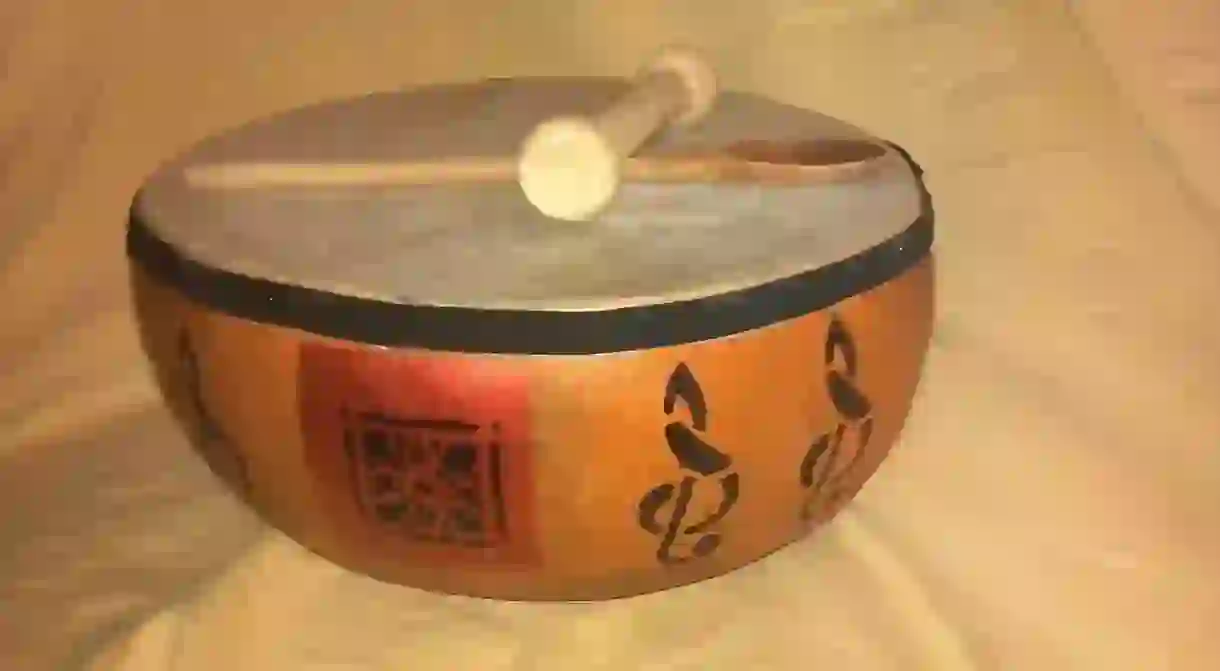10 Things You Can Buy Only in Cameroon

The toghu is one of the things you can buy only from Cameroon, but there are a few other special items, too. Here are some of the unique things to look out for while you’re there.
Oku white honey

Harvested on the Kilum Ijim mountain forest, Oku white honey is said to derive its creamy properties from two plants that grow in the area, schefflera abyssinica and nuxia congesta. Bees that pollinate these plants produce white honey. Over 600 bee farmers are affiliated with the Oku Honey Cooperative, a body that coordinates marketing, the intellectual property of the local brand and the sustainability of the forest. Oku white honey is believed to have medicinal value.
Toghu

Those who’ve seen Cameroon parading in the Olympics have probably noticed the toghu, the traditional outfit of many tribes in the Northwest Region. Until recently it was reserved for grand occasions, but modern stylists have made it a part of everyday life. The original hand-stitched cloth has inspired print designs that can be used for jackets, skirts and gowns. The toghu can be bought at most markets in the Northwest and several other places across the country.
Palm kernel oil

Not to be confused with palm oil, which comes from the flesh of the palm fruit, palm kernel oil is extracted from the innermost kernel. It’s known locally as minyanga, and many women in rural Cameroon feed it to their babies to keep them healthy. It can be stored for longer periods than vegetable oil, which makes it ideal for commercial cooking. Palm kernel oil can also be applied directly as body lotion and is also used to make soap. It has zero cholesterol.
Sha
Home-brewed corn beer, or sha, can be found in bars that sell palm wine, and is taken with cola nuts. Sha is mostly brewed and sold by women, many of whom have passed the technique on to their daughters. One thing you can’t do is take oranges where serve sell sha, as they will ruin the drink.
Leather sandals

The north of Cameroon is the centre of leather production. There are large herds of cattle and other animals, whose skin is used to make bags, purses, belts, drums and shoes. Handmade sandals are very popular in Cameroon and are the perfect match for traditional dresses. Many schools over the years have boosted the trade by adopting sandals as part of their uniform.
Handicrafts

Cameroon has over 40,000 craftspeople telling stories through their art. Museums are a great place to see bronze statues, wood carvings and paintings, but handicraft centres and craft markets offer the chance to buy some of these at affordable prices. Great places to buy handicrafts are Marche de Fleurs Douala, Prescraft in Bamenda and Buea and around Foumban Palace.
Nyanguv

This spicy jelly can be eaten as a snack or used to make a sauce. Roots of the plant are dug from marshy land and pounded, then cooked with spices into different shapes. When stewed, they can be eaten with fufu or pounded cocoyam.
Straw bags, caps and drinking horns

Traditional ceremonies usually attended by elders. Age really matters here, but the age of your bag can enhance your reputation. If you haven’t inherited a bag, cap and drinking horn, you can get them by visiting any craft shop. The one thing you can’t buy, though, are feathers; those have to be earned.
Bracelets and necklaces

Beautifully coloured bracelets are sold around most markets in Cameroon. Many of them include cowries, colourful plastic designs and beads. Worn with a marching T-shirt or traditional outfit, these can signal good local taste. They can be personalised to include names or a message.
Whispering curtains
In public houses where people can just walk in, those inside can be alerted when someone touches the blinds. Curtains made with beer crowns, seeds of the black fruit or dry raffia palm fruits are perfect for this.













